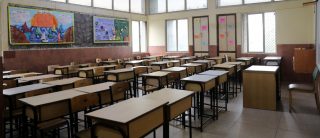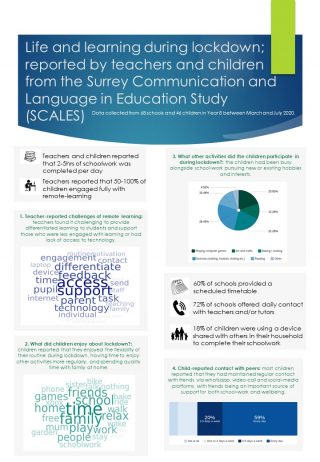Life and learning during lockdown; reported by teachers and children from the Surrey Communication and Language in Education Study (SCALES)
In March 2020, the UK entered lockdown due to the Covid-19 pandemic. Classroom-based schooling moved to remote-learning, and both children and teachers had to adapt to this new way of life. One of the primary research aims of the Surrey Communication and Language in Education Study (SCALES) is to investigate how language can support academic achievement and mental health. Whilst the long-term effects of lockdown for school-aged children are still unknown, it is understandable that there are concerns for both educational progress and wellbeing. During lockdown, we collected data to gain an insight into how children and teachers from SCALES were dealing with these unprecedented times.
When l ockdown began, we were almost halfway through our 5th wave of data collection for SCALES. We were lucky to be able to take our SCALES assessments online and remotely assessed 49 more children during this period. In addition to their SCALES assessment, we asked these children to answer some questions about their experiences of lockdown, how they were engaging with learning from home, and the impact it was having on other aspects of their lives. We also asked teachers in our SCALES schools to provide information about how their school was continuing to teach and support children during lockdown, and any difficulties they had encountered when teaching remotely.
ockdown began, we were almost halfway through our 5th wave of data collection for SCALES. We were lucky to be able to take our SCALES assessments online and remotely assessed 49 more children during this period. In addition to their SCALES assessment, we asked these children to answer some questions about their experiences of lockdown, how they were engaging with learning from home, and the impact it was having on other aspects of their lives. We also asked teachers in our SCALES schools to provide information about how their school was continuing to teach and support children during lockdown, and any difficulties they had encountered when teaching remotely.
The information presented below is a summary of the data obtained from 68 schools and 46 children involved in SCALES. Our infographic provides an overview of the data collected.
_______________________________
Teachers reported that children were completing around 2-5 hours of school work a day on average. The majority of schools were providing a scheduled school day, but some allowed a free-schedule for children to complete work as and when they were able to. Engagement rates with teaching varied vastly with most schools reporting between 50-100%. Poorer engagement was often linked to disadvantaged children who had lack of access to technology, poorer Wi-Fi, no quiet working space and/or shared laptops with siblings or parents. Those with additional needs also struggled to engage with the new way of learning without one-to-one support available. Children reported similar difficulties with remote-learning, but most had adapted well to the new way of learning. Some children reported that they struggled to keep focussed at home, particularly if they lived in a busy household and found it harder to engage with lessons without the instant support from their teacher if they had questions about their work.
Despite teachers and schools being faced with many challenges of remote-learning, they sought hard to support their pupils and their engagement through:
- Working to a daily timetable
- Regular contact / video calls with pupils
- IT Support
- Live lessons
- Encouraged parental support
- Monitoring of engagement and follow-up with those less engaged
- Clarity and consistency of communication
- Pastoral support for vulnerable children
- Differentiated resources (SEND support)
- Virtual assemblies
- Providing laptops to children in need
It was encouraging to hear that our SCALES children were mostly in high-spirits, despite the difficult and unusual circumstances, and most had settled into their own new routines throughout lockdown. Whilst a lot of our SCALES children had regularly kept in touch with friends through WhatsApp & social-media platforms, they were keen to return to school so that they could see their friends in person and experience school-life once more. If there’s one thing we can take from lockdown, it’s that we have undoubtedly established a generation of both adaptable and resilient children!
